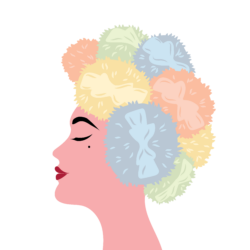Sloth rarely arrives with a grand announcement. It seeps in over time through the drawers you stop opening, the routines you skip without noticing, the mirror you begin to avoid.
In the world of beauty, sloth looks like disengagement. Not giving up, but just gradually fading out.
Sloth shows up in subtle, familiar ways:
- You stop experimenting with color because nothing feels worth the effort.
- You delay replacing the mascara that dried out weeks ago.
- Your once-reliable routine becomes a loop of half-steps: moisturizer, maybe… if you remember.
- You stop scheduling appointments. You stop asking questions. You stop caring. You’re numb and eroded.
Sloth is the slow ghosting of your own reflection.

A Different Kind of Exhaustion
Sloth in beauty is a psychological fatigue. It often follows seasons of hyper-performance—when you were “on” for so long that now, the thought of trying again feels too heavy. You lose curiosity and your desire to feel beautiful flattens because you’ve lost momentum.
And then comes the guilt:
“I should be doing more.”
“I used to care.”
“I don’t even know what looks good on me anymore.”
Sloth reveals drifting and detachment from ritual.
Sloth Onscreen
In Fleabag, we watch the title character’s beauty routines decline as her emotional world unravels. Her lipstick is uneven. Her hair undone. Her face slowly stops playing its public role. She stops caring because she’s drowning.
That’s how sloth often works: A body still upright, a face still shown, but the inner self no longer participating.

A Chance to Re-enter
Sloth is an invitation to reenter beauty at a gentler pace and to reconnect with your reflection without pressure, precision, or performance.
As a makeup artist, I’ve seen this. Clients who once loved the process but now feel… nothing. And yet, when we sit down and start slowly, with one product, color, or reminder that they still deserve to take up aesthetic space, something stirs.
Sloth in beauty is felt in the hollow space where joy used to live. The answer isn’t to push harder. It’s to start smaller. One reason to begin again.
